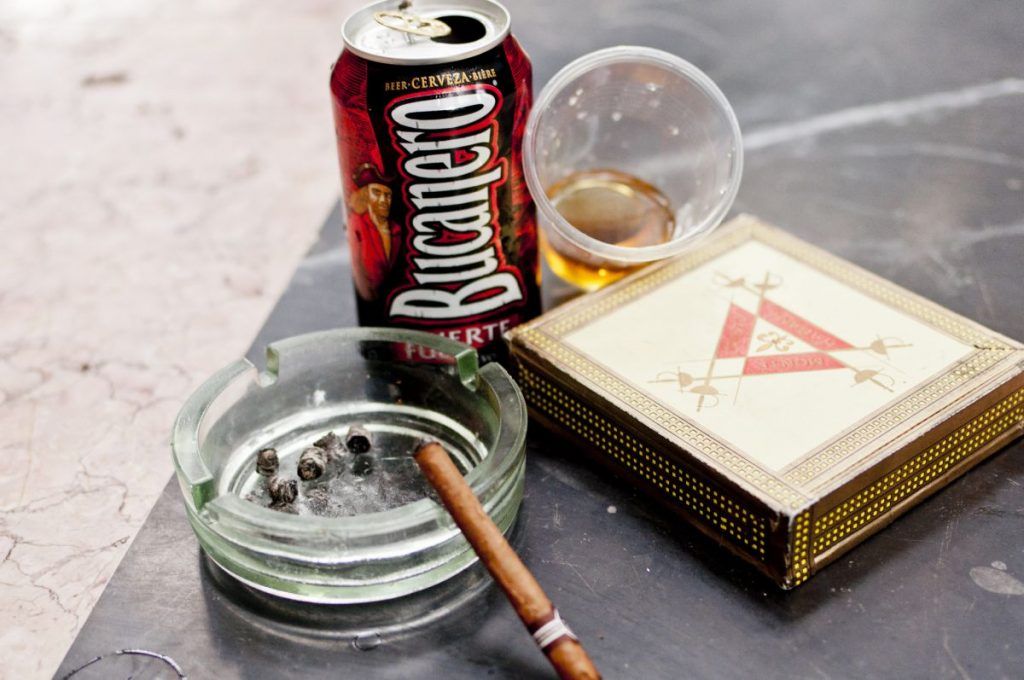U.S. President Barack Obama has lifted all restrictions on the amount of rum and Cuban cigars U.S. travellers are allowed to bring home from Cuba in an effort to normalize relations with the communist-ruled island.
A new round of executive actions announced by the Obama administration Friday aims to establish trade links with Cuba and ease restrictions that have been in place for a generation. The news follows announcements that Putin is considering restoring a Russian Military base there.
Under the new rules, which go into effect Monday, travelers can purchase unlimited quantities of Cuban rum and cigars in any country where they are sold so long as they are for personal consumption. Sorry American couch potatoes: You can’t order Cuban rum and cigars online and have them shipped to your home.
The regulations issued by the U.S. departments of Commerce and Treasury will make it easier for U.S. companies to import Cuban-made pharmaceuticals, U.S. agricultural companies to sell their products to the island and Cubans to purchase U.S.-made goods online.
The changes follow a series of steps taken since President Obama and Cuban President Raúl Castro announced on Dec. 17, 2014, that the Cold War foes would normalize relations after more than a half century of enmity.
On Friday, Obama added to the regulatory changes with a presidential policy directive that outlines his Cuba strategy thus far and lays out the future course. It includes a call for Congress to rescind a 50-year-old economic embargo on the island, something lawmakers have been unwilling to do so long as the Castro regime suppresses political and other freedoms.
The goal of the new regulations and policy directive are to make Obama’s Cuba policy “irreversible” by establishing so many relationships with Cuba that a future administration wanting to scale back those ties would face widespread opposition from U.S. businesses and citizens.
“Challenges remain — and very real differences between our governments persist on issues of democracy and human rights — but I believe that engagement is the best way to address those differences and make progress on behalf of our interests and values,” Obama said. “The progress of the last two years, bolstered by today’s action, should remind the world of what’s possible when we look to the future together.”
The most noticeable — and likely most welcome — change for most Americans is the removal of the five-decade ban on Cuban rum and cigars. The Obama administration partially lifted that ban in January 2015, allowing Americans traveling directly to Cuba to return home with up to $100 in rum and cigars in their carry-on luggage.
Now, that monetary restriction is removed and U.S. citizens can purchase as much Cuban tobacco and alcohol as they want from anywhere they find the products abroad. That means all those Cuban bottles and boxes at duty free shops in foreign airports are fair game. The only restriction, according to Treasury: “Normal limits on duty and tax exemptions will apply.”
Other changes announced Friday:
- Cuban pharmaceuticals can receive approval from the U.S. Food and Drug Administration and be marketed, sold and distributed in the U.S. American scientists will be allowed to work on joint medical research with their Cuban counterparts.
- Cargo ships can visit U.S. ports immediately after departing Cuba. Vessels previously were barred from loading or unloading freight at a U.S. port for 180 days after docking in Cuba.
- Americans can award more grants in larger amounts to Cubans.
- U.S. businesses can work in Cuba to develop the country’s civil aviation security system. U.S. airlines recently began regularly-scheduled commercial flights to Cuba, which has raised concerns among some in Congress that Cuba’s airports are not equipped to secure U.S.-bound flights.
- Cubans can purchase U.S.-made goods online, although the Cuban government tightly restricts Internet access.
“Already we’re seeing what the United States and Cuba can accomplish when we put aside the past and work to build a brighter future,” White House National Security Adviser Susan Rice said in a speech in Washington on Friday “You can now celebrate with Cuban rum and Cuban cigars,” she joked.
Some U.S. businesses said Obama didn’t go far enough in what may be the last round of relaxed rules during his presidency.
John Kavulich, president of the New York-based U.S.-Cuba Trade and Economic Council, said businesses were hoping to see a variety of other changes, including an expansion of exports to Cuba and the ability of Cubans to establish bank accounts in the U.S.
“Boardrooms and offices across the country are gratified that President Obama has made meaningful changes to regulations governing commerce and travel with Cuba,” he said. “However, the President has again chosen a less-than-dynamic regulatory path, and, as a result, challenged his legacy-building efforts with Cuba.”

